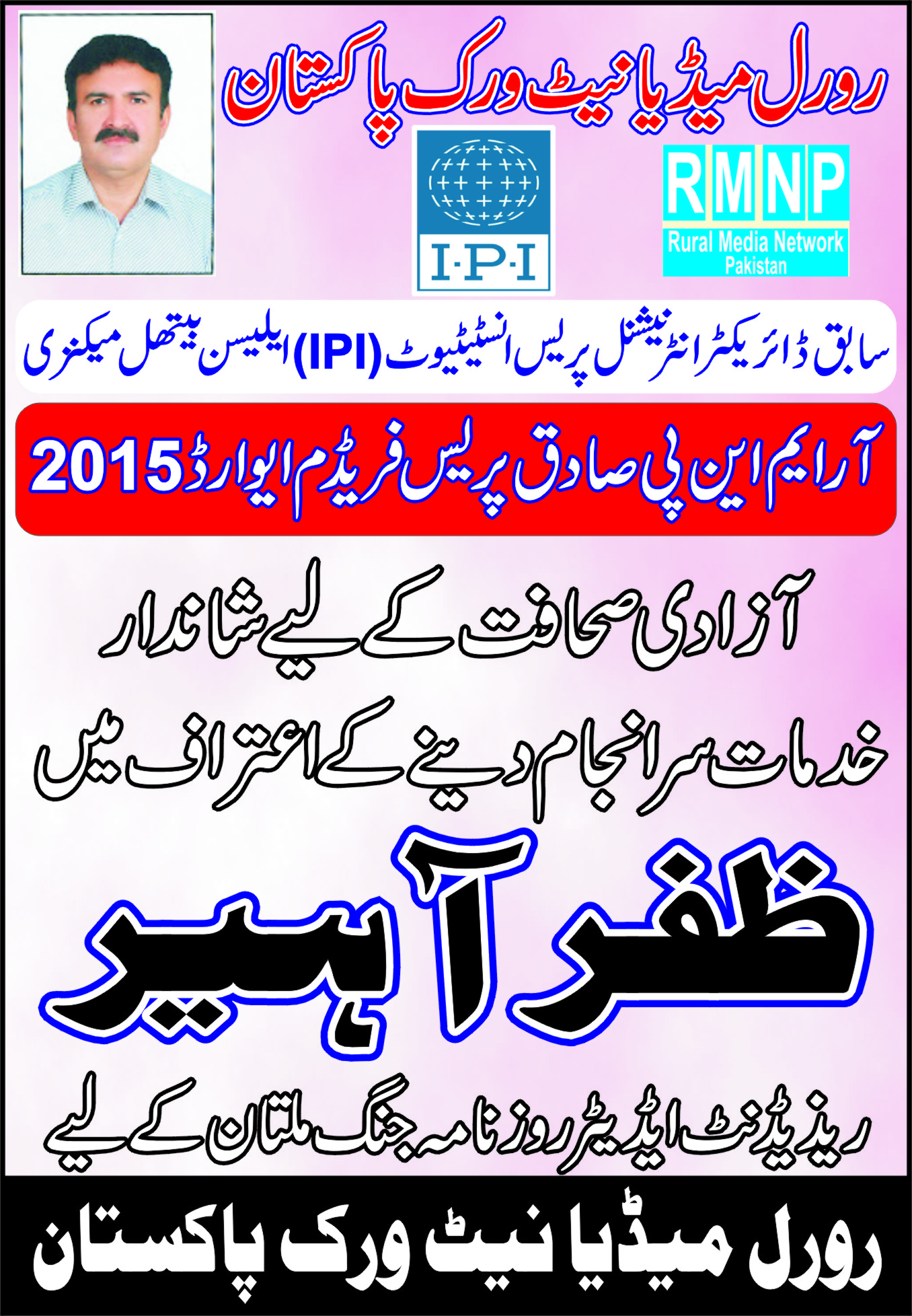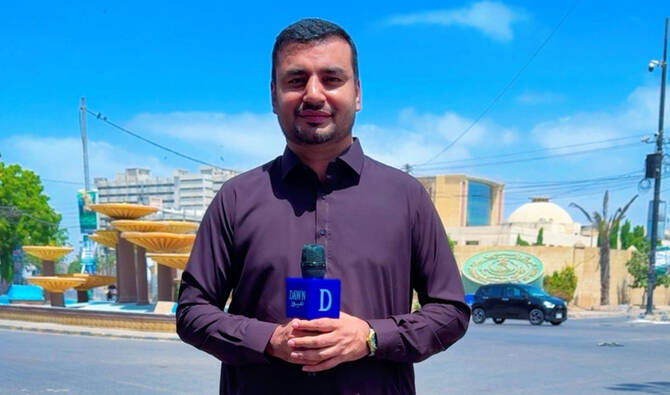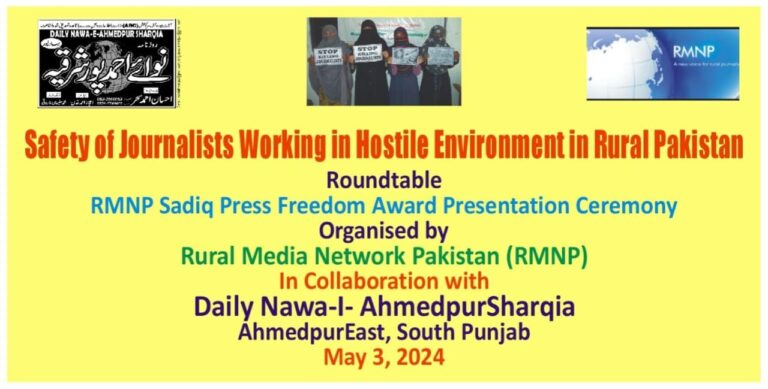Participants at RMNP-UNESCO seminar call on the UN to appoint a Special Rapporteur on journalists’ safety
Expansion of Existing Monitoring Network on Crimes Against Journalists
RMNP-UNESCO Seminar ( May-1-3,2019)
RMNP-UNESCO seminar for the” Expansion of Existing Monitoring Network on Crimes against Journalists” concluded on 3rd May in AhmedpurEast,rural Pakistan.It was attended by leading press freedom advocates ,regional leaders of mainstream political and religious parties, heads of different rural press clubs and unions of journalists. Seminar started with the recitation of Holy Quran and registration of the participants

President RMNP Ehsan Ahmed Sehar highlighted the role of UNESCO in Promoting International Efforts to Protect Journalists and Fight Impunity”
He informed the participants that UNESCO actively promotes the safety of those who produce journalism and believes that they have the right to work free from the threat of violence and to ensure the right to freedom of opinion and expression for all. President RMNP said that though UNESCO Islamabad organised a ” National Consultation Meeting on Safety of Journalists” on 05 November 2012 in Islamabad, but prior to it UNESCO HQ approved a “Safety of Journalists Training Project” on the request of RMNP in 2010, under which 100 journalists were trained in South Punjab.He further told that The UN Plan of Action on the Safety of Journalists and the Issue of Impunity is the result of a process that began in 2010 .The UN Plan of Action was prepared during the first UN Inter-Agency Meeting on this issue in September 2011. It was endorsed by the UN Chief Executives Board on 12 April 2012 , the highest level coordination mechanism in the UN system. Consequently, a second UN Inter-Agency meeting took place in November 2012 where a comprehensive Implementation Strategy was adopted. The strategy included over 120 concrete actions that could be taken on the protection of journalists and its related issues.

The Implementation Strategy served as the basis for the review process which took place during the third UN Inter-Agency meeting, which was held in November 2014 in concurrence with the inaugural International Day to End Impunity for Crimes against Journalists. The meeting reviewed the implementation of the UN Plan of Action from 2013 to 2014 including the successes, challenges, lessons learnt and the way forward.
On 29 June 2017, a Multi-Stakeholder Consultation on Strengthening the Implementation of the UN Plan of Action took place in Geneva, Switzerland to take stock of developments and best practices of the first five years of the implementation of the UN Plan of Action, he further informed.
RMNP Chief told the participants that Pakistan was selected along with South Sudan, Iraq and Nepal where first phase of the UN Plan of Action for the Safety of Journalists was implemented. He briefed about several meetings and conferences organised by UNESCO Islamabad which were held in UN office, Director UNESCO office, Swedish ambassador residence besides hotels which were attended by concerned stake holders. He thanked UNESCO for supporting RMNP in the implementation of its three “Safety of Journalists training Projects ” under which 259 male journalists and female contributors benefitted from a training programme which equipped them with the necessary safety skills and knowledge to report in hostile environments. He also mentioned UNESCO support for an accessment based on the “UNESCO ‘s Journalists’ Safety Indicators”.
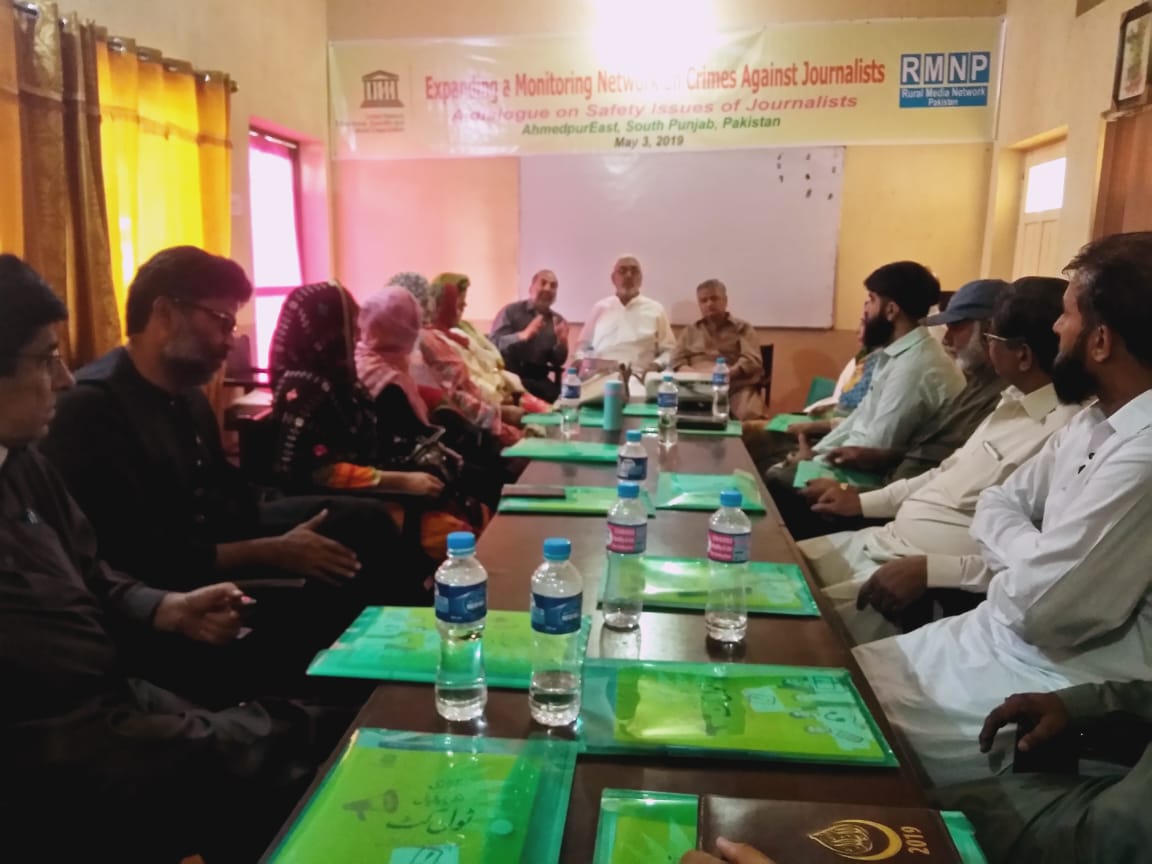
Participants reviewed the safety problems of journalists in Pakistan and said that though Pakistani media is urban oriented, but majority of the journalists who were killed in the line of duty hail from rural areas and small towns. They expressed their deep concern over the dropping of Pakistan’s rating in the World Press Freedom Index and expressed their dis-satisfaction over the Ministry of Information & Broadcasting’s performance and alleged that the ministry was sitting on The Protection of Journalists Bill, since 2014.They demanded of the PTI government to table the security, safety and protection of journalists bill in national assembly for approval without further delay. Participants urged that the safety of journalists should be ensured and legislation be introduced under UN Resolution.
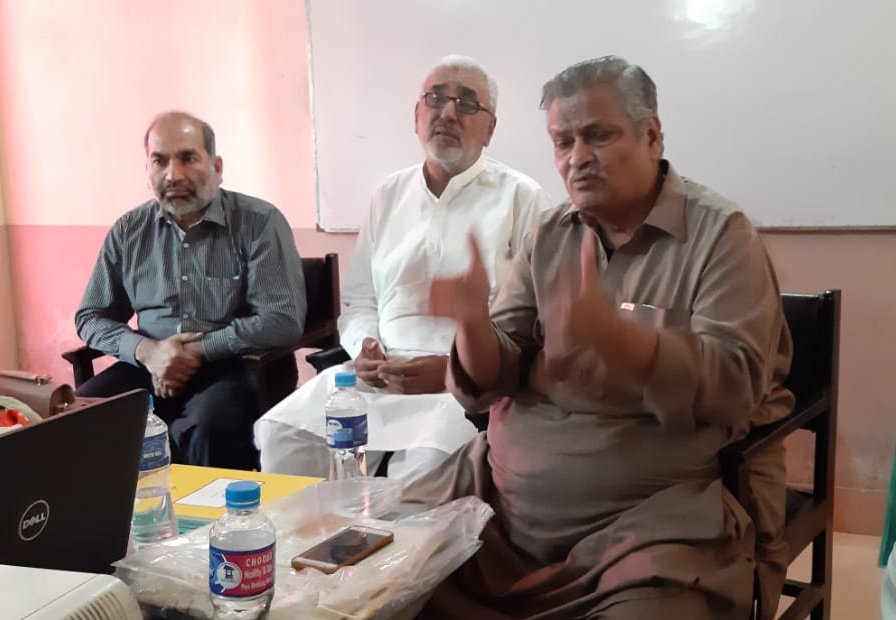
Rural Journalists Issues & Solution
Participants discussed the rural journalists issues in the first day of seminar. They said that rural journalists represent Pakistan’s 65 percent population. But there is no comprehensive system to act when a journalist is attacked, kidnapped or to tortured. No one is aware of any hot line, if exists. Rural journalists have no contacts with the journalist bodies active in big cities.
- a) Local press clubs are not playing their role as expected; therefore rural journalists work in miserable conditions. A centralized system to monitor press freedom violations in Pakistan in not available.
- b) Rural journalists are back bone of the media industry. They are usually unpaid, in many feudal dominated areas; rural journalists are working as puppets of feudal lords. Due to mushroom growth of journalists in rural areas and small towns, it is necessary to prepare them to address their safety issues. It is urgent need to improve their working conditions.
- c) All Pakistan Newspapers Society (APNS), Council of Pakistan Newspaper Editors (CPNE) and Pakistan Broadcasters Association (BPA) should come forward and pay attention to their rural correspondents’ long standing problems.
- d) Since 2002, national dailies and TV channels have appointed their correspondents not only in small towns but also at union council level. In our view current strength of Pakistan’s journalists is higher than PFUJ’s figures of 22000.More training sessions are required in those far-flung areas where journalists are untrained and working in hostile environment.
- e) Lack of attention towards professional ethics has posed risks for rural journalists. Media houses are not paying attention to train their respective correspondents and field reporters. Training of field reporters would definitely minimize the security risks.
- f) Dangerous race of “Breaking News” without confirming the facts has claimed the lives of many rural reporters in Pakistan. Owners of the media houses did not realize that anchors are putting field reporters at risk.
- g) Rural journalists are generally less educated and their access to computer is still limited. It is due to meager resources and lack of training. Internet training is essential to follow the safety guide lines and monitoring the press freedom violations.
- h) There is glaring absence of female journalists in rural Pakistan which means that women perspective is missing in our national media. UNESCO and international organisations should pay attention and play its role to address this issue.
- i) Self-censorship is imposed on daily basis as journalists are facing threats from fundamentalists, extremists and in some areas from feudal lords.
Senior Civil Judge(r) Mr Yahya Khan Kulachi conducted a session on the impunity. He stated that impunity means exemption from punishment or freedom from the injurious consequences of an action . He told the panelists that most abuses against media professionals remain uninvestigated and unpunished in third world countries. This impunity perpetuates the cycle of violence against journalists, media workers and citizen journalists. The resulting self-censorship deprives society of information and further impacts press freedom, he added.
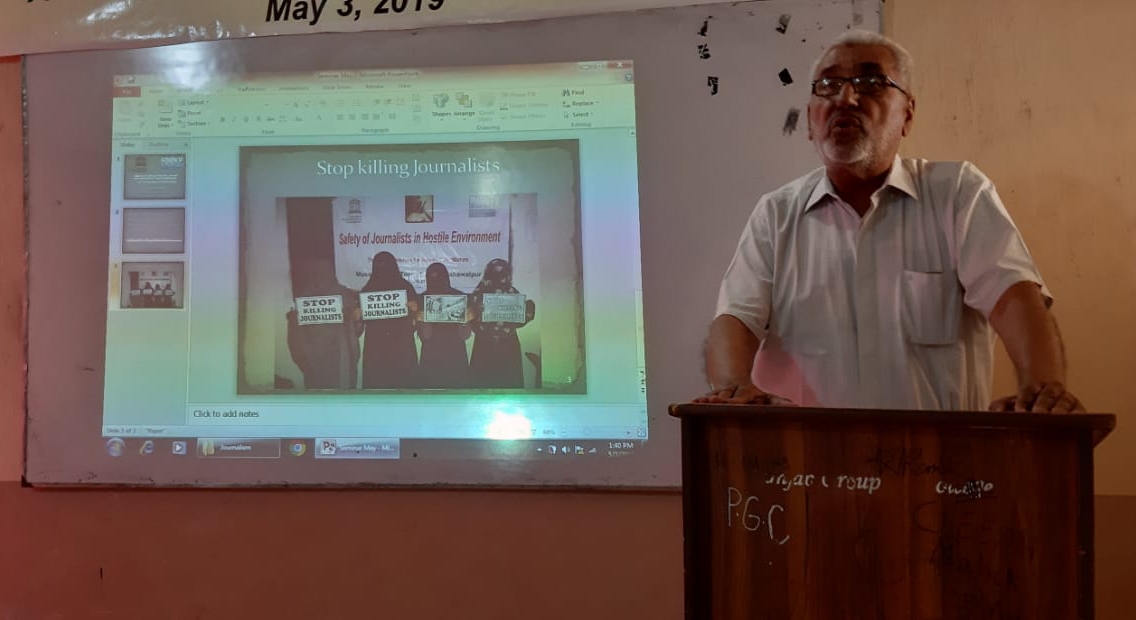
Professor Shehzad Ahmed Khan and Professor Dr Sajjad Ahmed Paracha said that the killing of journalists and its impunity directly impacts the United Nations’ human rights based efforts to promote peace, security, and sustainable development. The impunity enjoyed by the killers of journalists in Pakistan is one of the highest in the world and the murdered journalists and their families have received justice in only few cases as per media reports. They endorsed the views of participants who alleged that “Justice delayed-Justice denied” in Pakistani journalists murder cases. Former judicial officer Mr.Kulachi suggested that challan of the murder cases of journalists should be submitted to Anti-Terrorism Courts for speedy trial. He also suggested taking district bar associations on board for getting free legal assistance in poor and needy journalists cases.
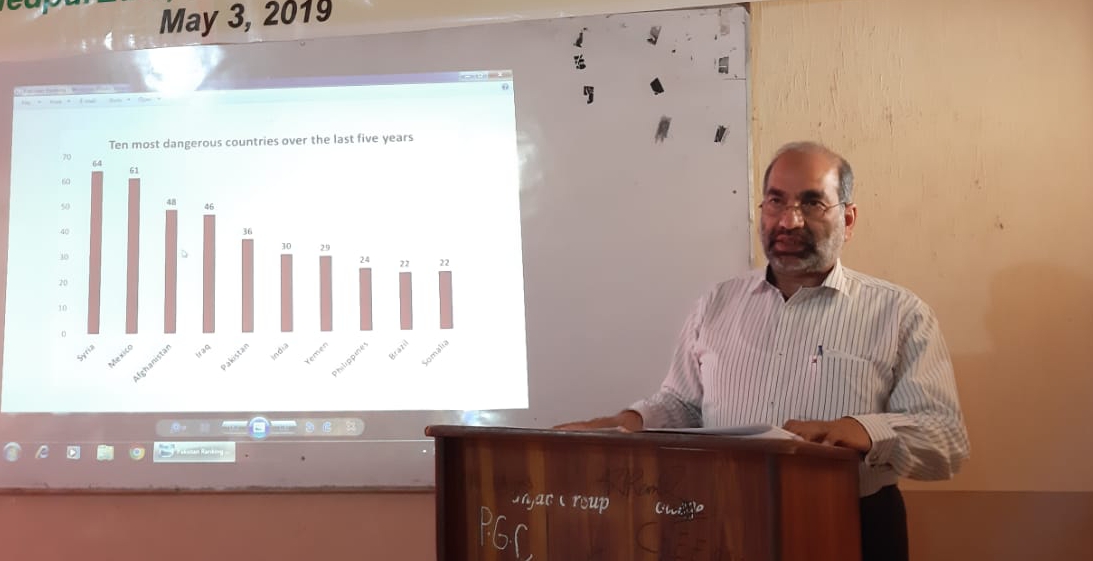
Ehsan Ahmed Sehar, the President of the Rural Media Network Pakistan (RMNP) and journalist Ms. Aaasia Batool said on the occasion that “Journalists continue to get target killed and threats against them continue to grow and the State’s legal system (police failure) and justice system (courts failure) have failed to provide them justice,” They urged all stakeholders of media to join hands to fight back deep-rooted impunity for crimes against journalists and the media. Participants discussed the role of law enforcing agencies in dealing with impunity besides the current challenges for journalists and underlined the need of the unification of all factions of the Pakistan Federal Union of Journalists (PFUJ) to cope this situation.
Journalists Shahid Bashir,Khadim Somro, Rashad Aziz Hashmi and Ahmed Khan Babar revealed that that religious leaders in various small towns and rural areas , keen to have their speeches denouncing other sects published in full, will threaten journalists who resist.

“Local religious leadership does not understand that correspondents have no control over editorial policy, and journalists receive threatening text messages from militants – this is a serious matter and deserves immediate action at the highest level.”
They described the different threats facing journalists in certain areas of the country, varying from influential figures harassing journalists who report on honour killing and gang rape incidents, to targeting by the Taliban, other militants and even security agencies. They added that authorities often falsely accuse journalists of various crimes should they carry out work exposing corruption.
They argued that other important constraints on media freedom which impinge on journalists’ ability to do their work are the cultural of secrecy and the levels of bureaucracy concerning access to official information.
“Journalists find it almost impossible to find information related to large government deals or projects, and ministries remain tight-lipped on their activities and finances, denying access to information for journalists,” noted President RMNP.
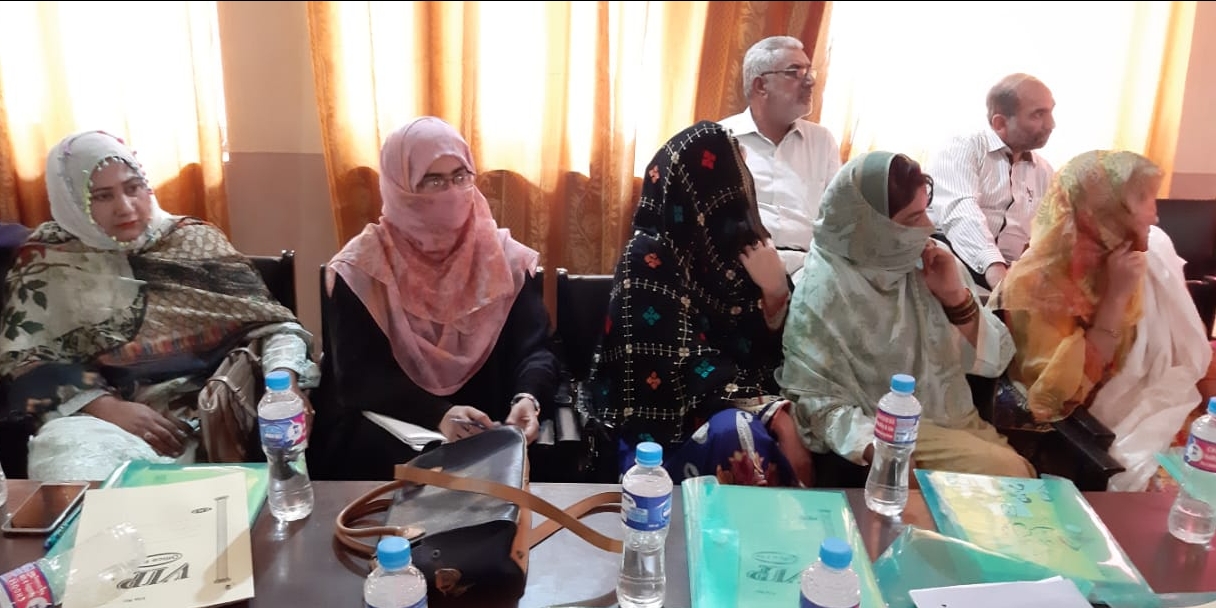
Similarly, the Pakistan Electronic Media Regulatory Authority (PEMRA) has been used to silence the broadcast media by either suspending licenses or simply threatening to do so. In addition, media houses are also exposed to propaganda from state agencies, pressured by powerful political elements and non-state actors involved in the current conflict to publish what they are spoon-fed.
Participants watched World Association of Newspapers & News Publishers (WAN-IFRA) film related with freedom of expression and press freedom and thanked Director, Press Freedom WAN-IFRA Mr Andrew Heslop for sharing this film to RMNP. Participants also touched upon various issues like, freedom of expression, financial pressures on electronic and print media and sacking of thousands of media employees in prevailing media crisis.
On the second day of the seminar, RMNP senior coordinator Suleman Farooqi presented the performance report of the28 press freedom monitoring committees constituted by RMNP since 2010.He informed the participants that sixteen press freedom monitoring committees found active while remaining twelve are functioning slowly. He informed the participants that RMNP alerts have been quoted by International Press Institute(IPI),Committee to Protect Journalists(CPJ),World Association of Newspapers & News Publishers (WAN-IFRA),World Editors Forum, International News Safety Institute(INSI),Doha Centre For Media Freedom, Commonwealth Journalists Association, (CJA), Commonwealth Human Rights Initiative (CHRI) and other press freedom organisations since 2005.He further informed that RMNP is only press freedom organization in Pakistan, which is mentioned in the Director General UNESCO’s statement while condemning the murder of journalist Munir Ahmed Shakar in Kuzdar district of Balochistan on 24th August 2011.
Mr Suleman Farooqi said that now a total 30 press freedom monitoring committees will furnish reports to RMNP about press freedom violations in their localities while RMNP will set up its new monitoring desk for the documentation of press freedom violations in Pakistan in near future.
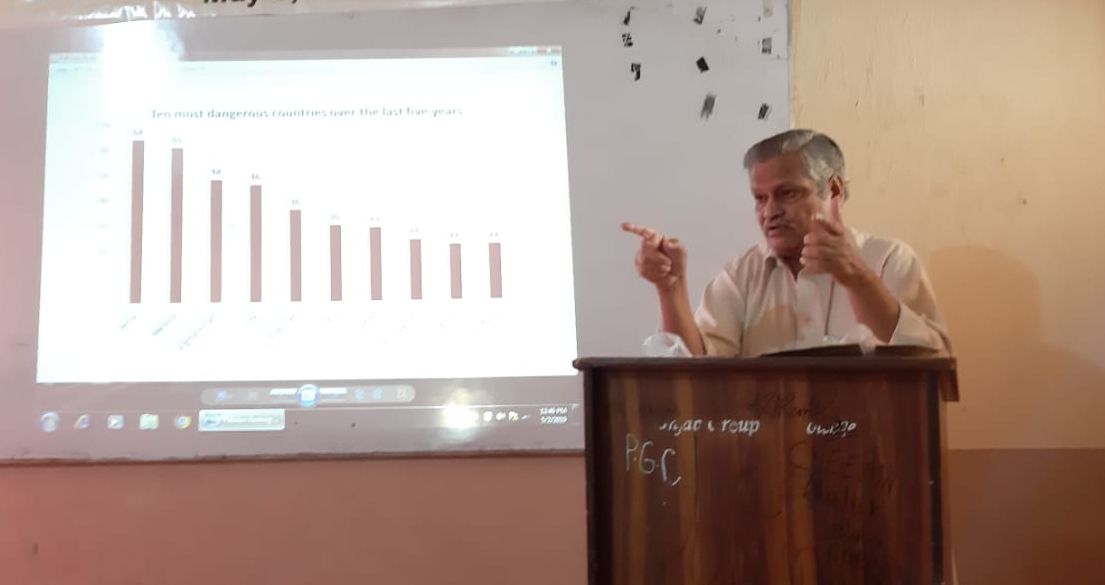
He also briefed about the capacity building of the journalists on safety issues and said that since 2011 to April 2019, RMNP have organised a total 30 training workshops in the far-flung areas of rural Pakistan besides two safety seminars which were attended by more than one thousand journalists. He said that RMNP organised training sessions at those places where earlier no other Pakistani organization reached.Mr.Farooqi vowed to continued RMNP struggle for the provision of safe environment to the working journalists and said that six senior journalists would transfer the acquired skills to other colleagues in their respective localities. Similarly RMNP plans to organize one day safety training sessions in those press clubs where journalists have not been benefitted so far.
Participants also exchanged views about the possible support of media organisations and journalists bodies for the protection of journalists. Urban-based journalists are paid and have support from their respective media organisations and official publicity departments,” noted President RMNP Ehsan Ahmed Sehar, adding “they are being provided maximum facilities by media owners as a result of the media ownership in the cities. Historically the development of media in Pakistan has taken place in metropolitan centres,” Mr.Sehar said, arguing “this is not unique to Pakistan, however what is perhaps different in the Pakistani context is that the development has not filtered down to rural areas.”As a result, rural journalists remain neglected, often working in isolation with extremely limited support from media organisations in financial, moral and professional terms. Mr.Sehar suggested that journalists themselves need to work together to bridge this gap and fight for their rights and the rights of their colleagues. Presenting a united front to the authorities, as opposed to a divided and disparate group of journalists from different locations, is essential to combating the many problems facing rural journalists. President RMNP made a number of suggestions for how to improve the current situation for journalists, arguing that media houses should provide safety equipment to all correspondents, irrespective of their location, and that reporters, cameramen and other support staff covering dangerous assignments must be provided insurance cover.

He argued that the widows of journalists killed because of their work should be paid compensation, while assistance for any serious medical injuries incurred in the field should also be provided. Media houses also have a responsibility to cover instances of journalists being kidnapped, and should ensure that attention remains on these cases until their release is secured.
RMNP chief suggested that more attention should be paid to specific rural areas where journalists face increased danger, noting that civil society organisations such as RMNP can help identify these hotspots of violence. He also emphasised the pressing need to improve capacity-building measures for journalists in the field, noting that professionalism and safety training are essential to developing media freedom in Pakistan.
“Less-than-professional coverage of every incident of terrorism, accident, flood, election and other events” has exacerbated the tension around these incidents,” President RMNP argued, stating that many parts of society are now calling for codes of ethics to be implemented in media houses. This has also been highlighted by journalists, who have in recent years called for a comprehensive overhaul of the way the media operate in Pakistan, to avoid any accusations of corruption.
Ehsan Ahmed Sehar suggested that the other factors essential to protecting journalism as a profession in Pakistan include pluralism, an open market and the airing of different points of view as opposed to partisanship. But for any measures introduced to make any difference to rural journalists in Pakistan, it is essential that the journalists themselves, or those with experience of how their work is carried out, are involved in formulating future plans to protect their fraternity.
President RMNP informed the participants that to sensitise the journalists on their safety issues in whole Pakistan, RMNP intends to publish and distribute printed copies of its updated “safety training manual” among 230 press clubs in near future. It will surely help the journalists to deal with any hostile situation. Similarly RMNP will re-launch online FOE newsletter in Urdu language, he announced. Participants discussed the ways to partnering with more national and international civil society, human rights and press freedom organisations to expand and strengthen their network for the safety of journalists in coming years.
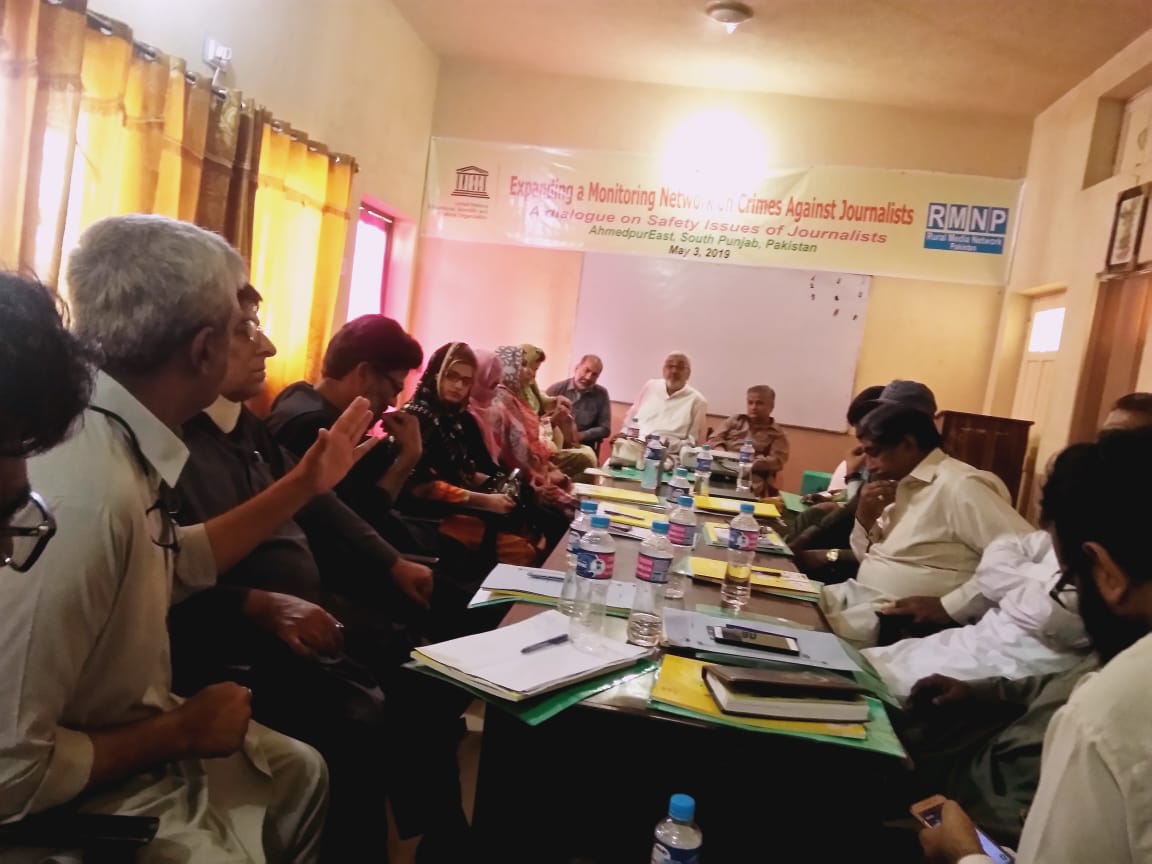
On 3rd May, RMNP-UNESCO seminar started with the suggestions for raising awareness about journalists safety issues among all segments of society especially law makers.
World Press Freedom Day roundtable was held on the theme “Media for Democracy: Journalism and Elections in Times of Disinformation”. This event provided a platform for multiple actors to exchange on current issues, threats and achievements concerning freedom of the press in Pakistan. Vice President National Press Club Islamabad Dr Sadia Kamal,Chairman Media Studies Department Islamia University Bahawalpur Professor Dr Sajjad Ahmed Paracha,Professor Shehzad Ahmed Khan,President RMNP Ehsan Ahmed Sehar,President Press Club AhmedpurEast Rafique Safdar,journalists Zia Shehzad Badani, Muhammad Akmal Sheikh,Ms Saba Aslam,Ms Aasia Batool and political leaders Muhammad Ali Ahsan, Abdul Basit Shikrami, Syed Salahuddin Ahmed Jeelani,Maulana Hakeem Muhammad Hussnein, Jam Saadat Lar and others presented their ideas.Former research coordinator Tokyo University,Japan Khalid Saeed interacted with panelist through video link from Karachi.He also responded the volley of questions of different panelists. The problems of media industry also came under discussion. President RMNP Ehsan Ahmed Sehar and Mayor city Malik Usman Rasheed Bobak presented “Best Female Journalist Cash Award” to Dr Sadia Kamal Vice President National Press Club Islamabad as recognition of her services in both rural and urban journalism since 2007, while President Press Club AhmedpurEast Rafique Safdar and Senior Vice President Makki Haider Jalwana also received “ Journalists Friend Awards”.
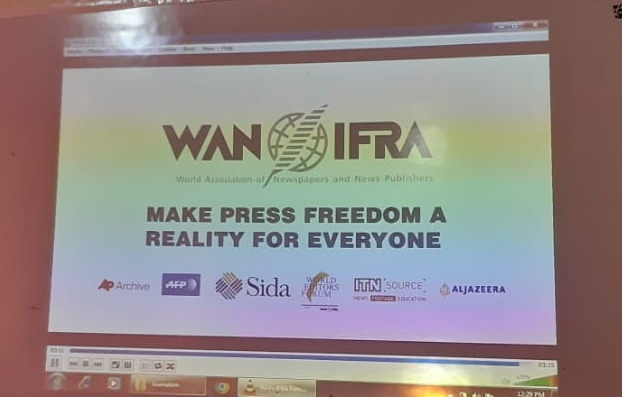
Messages Read & Distributed: RMNP distributed messages of Secretary General United Nations and Commonwealth Journalists Association UK stalwart William Horsley in the beginning of the World Press Freedom Day round table. RMNP member Ms. Saba Aslam read these messages in the round table after recitation of Holy Quran. Dua was offered for the departed souls of those Pakistani journalists who have been killed in the line of duty while all participants observed one minute silence for all those journalists who were killed throughout the globe.
Unanimous Resolutions
1-Participants of the 3-day through a resolution urged the General Secretary of the United Nations (UN) to appoint a Special Rapporteur on the safety of journalists, to put an end to impunity and to ensure that laws and operational mechanisms to guarantee their safety are activated.
2- Participants expressed grave concerns over failure of the Pakistani government to inform the UNESCO director general about legal proceedings of murder cases of the journalists assassinated in the line of duty. Through the other resolution, they demanded the Pakistani government to fulfill its obligations regarding safety of journalists as it is a signatory to the UN General Assembly.
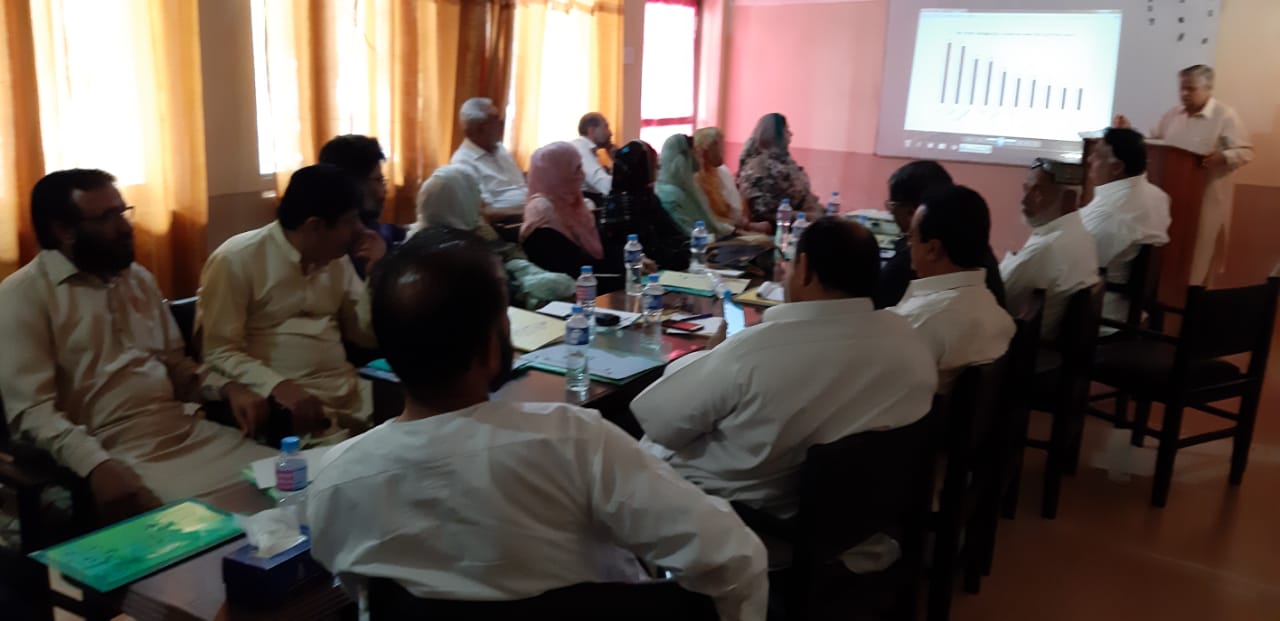
Recommendations by Rural Media Network Pakistan to end impunity for crimes against media
Rural Media Network Pakistan (RMNP), is only non-governmental organization which is based in rural Pakistan committed to promoting and defending freedom of expression recommends the following measures be adopted to control the alarming level of violence against media, and to end impunity for those who attack media practitioners and institutions.
1-Federal government should present “Journalists Safety & Welfare Bill” in parliament for approval without further delay.
2-Special public prosecutors on violence against media should be appointed at federal and all four provincial headquarters to investigate cases of violence against media.
3- Criminal cases should be registered without any delay but should also be properly investigated and prosecuted against the perpetrators of violence against media.
4- Media houses should take the responsibility in ensuring safety of media personnel. All Pakistan Newspapers Society (APNS), Pakistan Broadcasters Association (PBA), Council of Newspapers Editors(CPNE) along with all factions of Pakistan Federal Union of Journalists (PFUJ) should ensure long-term follow up of cases of assault on media organizations and workers
5- Journalists should be provided with safety and first aid trainings and guidance on how to report in hostile environment. Journalists working in conflict areas should also be provided with guidance in recognizing and dealing with stress and post-traumatic stress.
6-All media houses should provide safety equipment to their reporters i.e. bullet proof jackets, helmets and GPS Cell phones irrespective of the size of area and city.
7-All media houses should provide insurance cover to their reporters, cameramen and supporting staff who cover dangerous assignments.
8- Media house should pay at least one million rupees to the widow of a rural area journalist who is sending them news under any kind of arrangement written or verbal what so ever, if he is killed during the coverage of dangerous assignment and 0.5 million rupees if he gets serious injuries.
9-Media house should pay all the expenses incurred on his medical treatment until and unless he is fit to resume his routine activities.
10-All media houses should take immediate steps with consultation of concerned authorities for the safety of newsmen working in sensitive areas like Southern Punjab.
11- All media houses should take follow up actions if a journalist is kidnapped in line of his duty and make sure that he is released safely, without any harm.
.
12-Pakistan government should provide announced compensation of the previous government to the heirs of those slain journalists who had been killed in the line of duty.
13- Pakistan Bar Council and all four provincial bar councils should be taken on board to get the speedy information about the judicial follow up of the cases.

